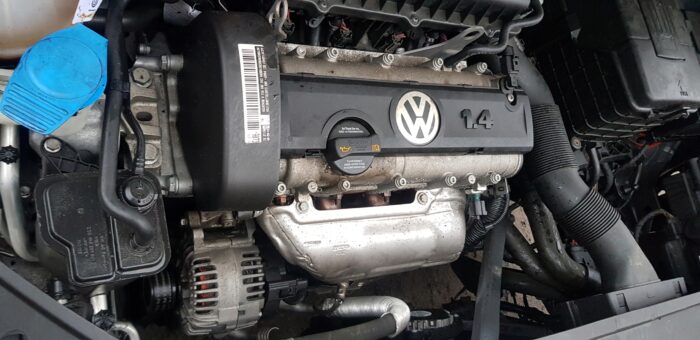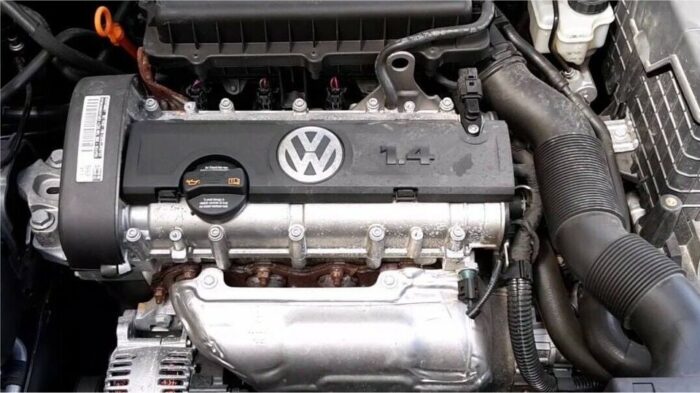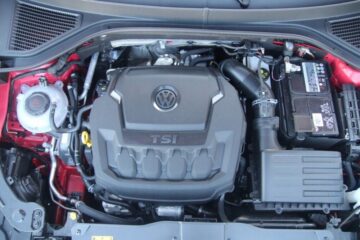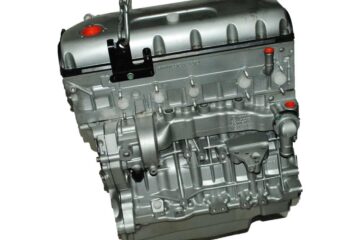The CGGA 1.4 MPi engine is a four-cylinder gasoline engine produced by Volkswagen AG. It was first introduced in 2007 and is still in use in some Volkswagen models. The engine is known for its good fuel economy and overall performance. However, some owners have reported issues that have affected its reliability.
Engine specifications for VW CGGA 1.4 MPi
| Displacement | 1390 cc |
| Power system | Injector |
| Engine power | 80 hp |
| Torque | 132 Nm |
| Cylinder block | Aluminum R4 |
| Cylinder head | Aluminum 16v |
| Cylinder diameter | 76.5 mm |
| Stroke | 75.6 mm |
| Compression ratio | 10.5 |
| Engine features | DOHC |
| Hydraulic compensators | Yes |
| Timing Chain/Belt | Two belts |
| Variable Valve Timing (VVT) | No |
| Turbocharger | No |
| Oil capacity/Recommended oil | 3.2 l 5W-30 |
| Fuel type | Medium/Plus |
| Euro class | EURO 5 |
| Average lifespan | 260 000 km |
The oil capacity, recommended oil type, and oil change intervals
The table outlining the oil capacity, recommended oil type, and oil change intervals for the CGGA 1.4 MPi engine in various Volkswagen models:
| Volkswagen Model | Oil Capacity (Liters) | Recommended Oil Type | Oil Change Interval (Miles/Kilometers) |
|---|---|---|---|
| Polo | 3.5 | 5W-30 or 5W-40 | 10,000 miles / 15,000 kilometers |
| Golf | 3.5 | 5W-30 or 5W-40 | 10,000 miles / 15,000 kilometers |
| Beetle | 3.5 | 5W-30 or 5W-40 | 10,000 miles / 15,000 kilometers |
Note that the oil capacity, recommended oil type, and oil change intervals may vary depending on the specific year and model of the Volkswagen vehicle with the CGGA 1.4 MPi engine. The above table is meant to provide a general idea of these specifications for the engine in Volkswagen models. It is always recommended to consult the vehicle owner’s manual or a certified mechanic for the specific requirements and recommendations for your vehicle.

Fuel consumption Volkswagen 1.4 CGGA
| Volkswagen Model | Fuel Consumption (L/100km) |
|---|---|
| Polo | 6.5 |
| Golf | 6.5 |
| Beetle | 6.5 |
Note that the fuel consumption may vary depending on several factors, including driving habits, road conditions, and vehicle load. The above table is meant to provide a general idea of the fuel consumption of the CGGA 1.4 MPi engine in Volkswagen models.
What cars use the CGGA 1.4 l
| Golf 6 (5K) | 2008 – 2013 |
| Golf Plus 1 (5M) | 2009 – 2014 |
| Octavia 2 (1Z) | 2010 – 2013 |
Common Problems with CGGA 1.4 MPi Engine
- Timing Chain Tensioner Failure: The timing chain tensioner is a common problem with the CGGA 1.4 MPi engine. It can cause the timing chain to become loose and result in engine damage.
- Oil Consumption: Many owners have reported high oil consumption with the CGGA 1.4 MPi engine. This can lead to engine damage and failure if not addressed in a timely manner.
- Water Pump Failure: The water pump is another common issue with this engine. It can cause overheating and engine damage if not replaced promptly.
- PCV Valve Failure: The Positive Crankcase Ventilation (PCV) valve is responsible for regulating the engine’s pressure. A failed PCV valve can cause oil leaks and engine damage.
- Ignition Coil Failure: The ignition coil is responsible for providing spark to the engine’s cylinders. A failed ignition coil can cause misfires, poor fuel economy, and engine damage.

FAQs
- How often should I change the oil in my CGGA 1.4 MPi engine? A: It is recommended to change the oil every 5,000 miles or as recommended by the manufacturer.
- What should I do if I experience high oil consumption with my CGGA 1.4 MPi engine? A: You should address the issue promptly and have the engine checked by a certified mechanic. High oil consumption can lead to engine damage and failure if not addressed in a timely manner.
- What are some signs of a failing water pump in my CGGA 1.4 MPi engine? A: Signs of a failing water pump include overheating, coolant leaks, and engine noise.
- What is the cost to replace a timing chain tensioner in a CGGA 1.4 MPi engine? A: The cost to replace a timing chain tensioner can vary depending on the mechanic and location. It can range from $500 to $1500.
- How can I prevent ignition coil failure in my CGGA 1.4 MPi engine? A: Regular maintenance checks and replacing the spark plugs at the recommended intervals can help prevent ignition coil failure. It is also essential to address any misfires or engine performance issues promptly.
- Is the CGGA 1.4 MPi engine used in any other Volkswagen models besides the one I own? A: Yes, the CGGA 1.4 MPi engine is used in various Volkswagen models, including the Polo, Golf, and Beetle.
- Can I continue to drive my Volkswagen with a faulty timing chain tensioner? A: No, it is not recommended to drive your vehicle with a faulty timing chain tensioner. It can cause the timing chain to become loose and result in severe engine damage.
- How often should I have my PCV valve checked in my CGGA 1.4 MPi engine? A: It is recommended to have your PCV valve checked during regular maintenance intervals, usually every 30,000 miles.
- What is the average lifespan of a CGGA 1.4 MPi engine? A: The lifespan of an engine can vary depending on several factors, including maintenance, driving conditions, and driving habits. With proper care and maintenance, the CGGA 1.4 MPi engine can provide over 100,000 miles of trouble-free driving.
- What should I do if I suspect engine damage in my Volkswagen with a CGGA 1.4 MPi engine? A: If you suspect engine damage, it is recommended to have the vehicle checked by a certified mechanic immediately. Continuing to drive the vehicle with engine damage can result in further damage and costly repairs.
Reliability
Despite the reported issues, the CGGA 1.4 MPi engine has shown to be relatively reliable. With proper maintenance and care, this engine can provide many years of trouble-free driving. Regular oil changes and maintenance checks can help prevent and address some of the common issues associated with this engine.
However, it is important to note that some owners have reported engine failure due to the issues mentioned above. It is essential to address any problems promptly to prevent further damage and costly repairs.



0 Comments